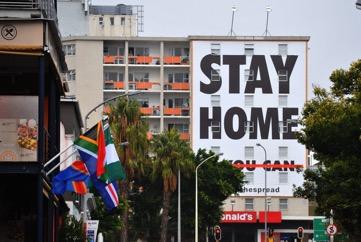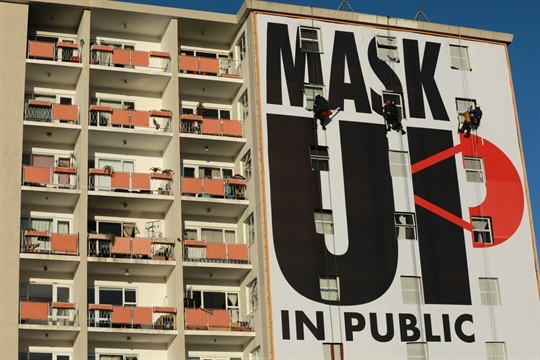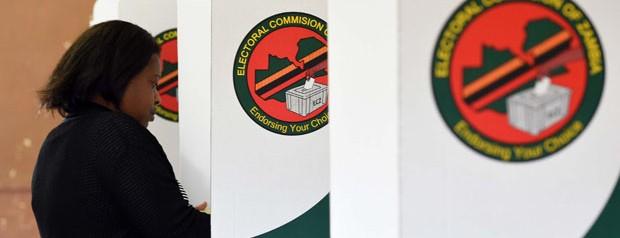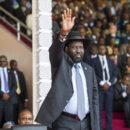
Debating Ideas is a new section that aims to reflect the values and editorial ethos of the African Arguments book series, publishing engaged, often radical, scholarship, original and activist writing from within the African continent and beyond. It will offer debates and engagements, contexts and controversies, and reviews and responses flowing from the African Arguments

Image Credit: BlackJack3D/ Getty Images Coronavirus morphology/network of cells
The eve of Africa Day 2020 marked 100 days since the outbreak of Covid-19 in Africa which has since infected 107,412 people and taken the lives of 3,246 people. Notwithstanding, African nations took their place among the rest of the world in mounting resistance against this epidemic. This piece celebrates a continent that is consolidating its place in global affairs and prioritizing its citizens despite its obvious challenges. The predictions about Africa and this virus were not good and were riddled with assumptions of complete failure to respond appropriately to the pandemic.
At 100 days of Covid-19’s spread in China, infections were at 100,000, in the US 776,907, in the UK 219,183 and at 100 days since the first infection, India was reporting 2,000 cases a day. At 100 days in Africa, no single African country is reporting numbers close to these.
Two months after the first cases of coronavirus in the world was confirmed, Africa recorded its first case in Egypt related to an asymptomatic Chinese national who landed at Cairo International Airport. The patient was detected because of the government’s rigorous preventative plan which involved screening and monitoring of travellers from coronavirus-affected countries. Since then, the virus has spread to all 54 countries, hitting Lesotho, the last African country to record a case, on 13 May. Recoveries as of 23 May stand at 42,626, 40% of the confirmed cases.

Stay-home sign on building in Cape Town, South Africa during the coronavirus lockdown. Credit: Gallo Images/Getty Images.
Government response to the pandemic
There is no doubt that government decision to monitor incoming travellers at border posts and eventually close borders across the continent were instrumental in curbing the spread of the virus. Temperature checks, information gathering, and sanitation stations were situated at airports and border posts.
At continental level, the Africa CDC launched the Africa Joint Continental Strategy for COVID-19 Outbreak and provided weekly briefings on the development of the virus on the continent. At country level, governments set up Covid-19 task forces, established testing centres and isolation facilities. As the virus continued to spread around the world, African countries instituted border closures beginning with restriction on the arrival of passengers from hotspots like China, Italy, the UK and the US to full border closures except for the movement of essential goods and return of residents.
School closures were followed by restrictions on large gatherings. Then came the curfews and stay-at-home measures with some countries imposing a complete lockdown and other focusing on states and provinces considered hotspots. With testing launched, ministries of health provided information on preventative measures such as sanitation, hand washing, social distancing and the use of masks.[1]
Governments also provided daily statistics on the status of the infection, recoveries and death and Information, Education and Communication (IEC) materials were developed in local languages. Social media was harnessed as an information sharing tool in addition to tradition media tools like radio and television. In Ethiopia, community leaders were mobilised to spread vital information on preventative measures, symptoms and treatment protocols for the virus.
These measures though difficult were necessary to limit the spread of the virus within countries and manage the burden on fragile health systems. Countries like Ghana, Nigeria and South Africa are relaxing restriction in order to balance out the pressure on the economy but are still enforcing social distancing and the wearing of masks.
Effect of government measures
Government response to the pandemic on the continent has not been without challenges. The lockdown has intensified food insecurity due to low agricultural production, transportation and importation. With little to no social protection and support mechanisms, sporadic food packages have not been able to meet the needs of the most vulnerable. A locust infection destroying vast amounts of vital crops is affecting production in East Africa and making matters worse.
An estimated 297 million pupils and students in Africa have been affected by school closures and the implementation of remote learning has been challenged by issues with cost and access to electricity, internet connectivity and digital equipment. There are strong concerns of students being left behind with some unlikely to reintegrate effectively into the formal class systems.
Planned elections have been suspended in a number of countries and where they have gone ahead, voter turnout has been low. In Kenya and Nigeria, lockdowns have ushered in a new wave of violence as police and soldiers are using excessive force to enforce the lockdowns. The stay-at-home orders have also put women and children at risk of violence, be it sexual, physical, psychological or economic and simultaneously isolating them from any help.
The economy has not gone unscathed with sectors such as tourism and oil hit the hardest. African nations are doing their best to mitigate the pressure of lockdowns and border closures on the economy by staggering the opening of businesses and providing stimulus packages to small businesses. In Egypt, the government has announced stimulus policies for a US$ 6.4 billion package to mitigate the economic impact of Covid-19 and in Morocco, citizens registered with the pension fund and those who have lost their jobs due to the crisis will receive 2,000 dirhams (US$ 204) a month and can put off debt payments until June 30. Delivery of pre-existing health programmes targeting malaria, polio, cholera, measles, HIV/AIDS and Ebola have been affected.

Image Credit: AP Photo/Nardus Engelbrecht. A billboard is seen in front of an apartment building in Cape Town, South Africa, Thursday May 21, 2020.
Pockets of ingenuity
Despite the prevalent rhetoric that Africa was going to buckle under the pressure of Covid-19, it would be remiss of the global community to ignore the astuteness with which Africa is fighting this pandemic. Initial coverage of Africa and Covid-19 was that of wonder on the low transmission rate on the continent spurring conspiracy theories around the resilience of the black skin and high temperature areas to the virus. This was followed by accusations of manipulation of data and once the virus began to spread, the reports took the usual neo-colonialist tone of a helpless Africa likely to be completely obliterated by this virus and at 101 days, reports are centred on how much aid and loans will be needed to help Africa navigate the negative effects of the crisis.
Let’s cast a different lens on Africa and see how a continent that has surpassed expectations, is making room for innovation and prioritising the safety and lives of Africans more than ever before:
Resilient leadership
Leadership is not a word that is often associated with Africa but there is no doubt that African leaders have risen to the occasion – some more than others – but overall the level of leadership is commendable. The Africa CDC has been playing its coordination and cooperation role by facilitating essential partnerships for testing, procurement and distribution of medical supplies and deployment of health workers.
At national level, swift action closing borders and instituting lockdown, though unpopular, have been key to controlling the spread of the virus on the continent. Leaders have shown up with their humanity, delivering hard truths, taking hard stances and at the same time looking for opportunities for a solution. Like the rest of the world, leadership in this crisis has not been perfect but in Africa and in this crisis, necessary decisions continue to be made to save as many lives as possible.
Developing testing kits in Senegal
Senegal has developed a testing kit that costs as little as US$ 1 and can detect the coronavirus in less than 10 minutes. Until a vaccine is developed, Senegal is implementing a forceful testing strategy on all citizens regardless of whether or not they show symptoms. Senegal is no stranger to infectious diseases and used its experience with AIDS and Ebola to develop the test. Researchers at the Institut Pasteur in Dakar have altered a diagnostic test originally made to test for Dengue fever. The test process is similar to a pregnancy test in that patients draw blood or saliva onto the device and wait for a bloodline to appear. This makes the test quick and mobile as samples do not need to be taken to a lab and results are almost instant.
As of May 19, Senegal, only had 30 deaths and has the largest number of recoveries in Africa and was third in the world ahead of countries with larger health budgets like the US and France. The country plans to ramp up production and export the test kit across Africa and to the rest of the world.
Contact tracing in Ghana and Morocco
With a similar low death toll as Senegal, Ghana’s success can be attributed to an impressive contact tracing protocol using large groups of community health workers and volunteers. The country is also utilising a technique known as “pool testing” in which multiple samples are taken and followed up as individual tests only if they test positive.
Morocco’s Ministry of Health has developed a mobile contact tracing application called “Wiqaytna” (“Our safety”). The app which is in its testing phase and should be rolled out to the public in a few weeks will allow health monitoring units to track those who contacted Covid-19 patients in the 21 days prior to testing positive. This application is an outcome of public private partnership and will possibly be rolled out to the rest of North Africa where the spread of the virus is highest.
Medication in Madagascar
Madagascar has used the Artemisia annua plant to formulate a herbal drink known as Covid Organics (CVO) which is believed to manage the symptoms of the virus. The WHO and the African CDC have discouraged the use of untested remedies and have requested the scientific data behind the medication. CVO is undergoing tests in a number of countries and the WHO has started a trial to test the efficacy of the drug and recently commended the country on its efforts to fight against Covid-19. This is not the first time Africa has been involved in drug trials. Between 2018 and 2019, the Democratic Republic of Congo was involved in trials for four Ebola therapeutics.
Madagascar has only recorded 326 cases and 2 deaths. Regardless of whether the drug is approved or not, the attempt to find homegrown solutions is evidence that Africans are taking their destiny in their own hands.
Production of Personal Protective Equipment (PPE)
Across the continent, governments have mobilised companies to begin the production Personal Protective Equipment (PPE) while education institutions have stepped up and are experimenting with the production of ventilators and other health equipment. In Zimbabwe, education institutions are producing hand sanitisers, masks and aprons for healthcare workers. Students at Dedan Kimathi University of Technology in Kenya are making everything from face masks to protective suits and have now set their eyes on making ventilators. Senegal is developing a prototype for ventilators while Ethiopia is upgrading old ventilators.
Robotics and drones
In Ghana, drone technology is being used to transport test samples and other medical products within the country. Rwanda has developed robots that can screen 50–150 patients per minute, deliver patient care, capture and store patient data.
Community initiatives
Across the continent, communities continue to show up for each other filling gaps where government assistance and policies have come up short. In Nigeria, a 7128 network of community health agents normally working on polio and other diseases are now spreading information in local communities of preventative measures and sanitation techniques. In Zimbabwe, Solidarity Trust Zimbabwe is raising funds to refurbish hospitals and provide support to the country’s Covid-19 hotline. Fashion houses are pivoting to producing non-surgical face masks, local feeding programmes have sprung up in different communities and funds are being raised at community level to support access to information and livelihoods for the most vulnerable. Individuals have come together to do their part to curb the spread of this virus.
Of course, we are still fighting the virus and as more information about the virus and its effects are known, so will Africa’s response adapt. There are obviously countries doing better than others in one area or the other and this piece is not to say that all the right decisions have been made. It however seeks to look at the rays of light in these very dark times and showcase Africa’s capacity to be her own solution and put her people first.
Therefore, we salute the frontline workers, the African leadership, the ones wearing mask and practising social distancing to keep their communities safe, the ones sharing our unique experiences far and wide, the ones staying home and respecting the lockdowns and curfews. This Africa Day celebrates you and your contribution to this fine continent.
End Note:
Aljazeera; BBC (UK and US); UN; The Conversation; African Arguments; All Africa; WHO; Africa CDC; Reliefweb; The Guardian; Anadolu Agency; IFC





